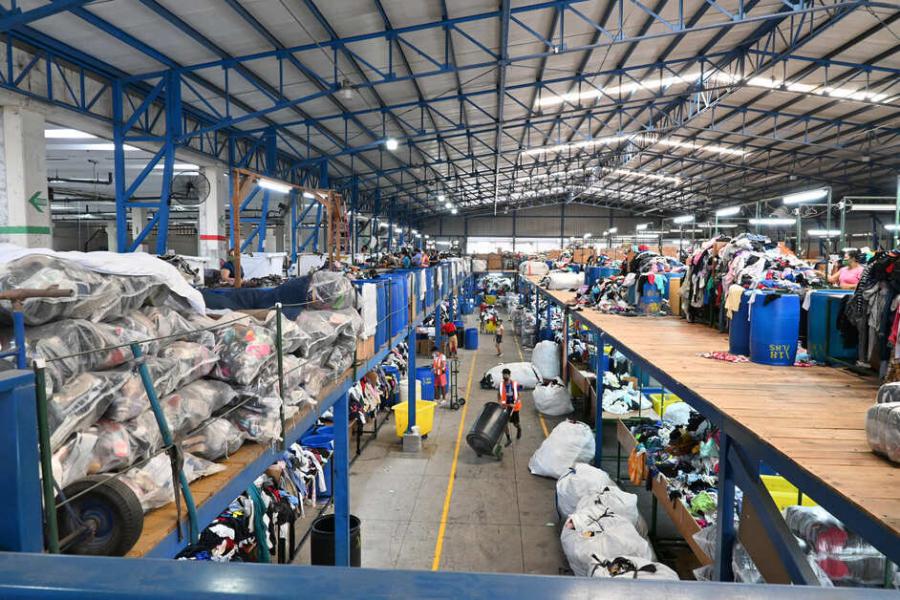Fashion
Study: Young people overconsuming fast fashion and dumping usable clothes

A new report from Garson and Shaw, global leaders in the second-hand clothes industry, has shown that reuse is the best way to tackle climate change.
— Lisa Jepsen, the CEO of Garson and Shaw
ATLANTA, GEORGIA, USA, June 24, 2024 /EINPresswire.com/ — A new report out today from Garson and Shaw, global leaders in the second-hand clothes industry, has shown a dramatic difference between the rates of overconsumption of clothing between younger people in the US and the rest of society.
The report also shows that the second-hand clothes industry in the USA makes a massive contribution towards reducing the impact of clothing on climate change and the environment.
Research for the report showed that 65% of Gen Z throw away at least one item of wearable clothing every month, compared to 36% of Gen X and only 25% of Baby Boomers.
The Environmental Protection Agency (EPA) estimates that there are 11 million tons of textile waste going to landfill in the US each year. Survey data collected for the report suggests that 5.5 million tons of reusable items are thrown in the trash by consumers annually. The equivalent of 10.4 billion items of clothing per year, or 4,000 truckloads of reusable clothing thrown away each week.
Data gathered for the report demonstrated that the most effective way to reduce the impact of textiles on the environment is to reuse unwanted clothing. Research shows that the second-hand clothing industry will save around 20 trillion gallons of water over the next decade, the equivalent of 30 million Olympic sized swimming pools, by offering an alternative source of clothing to the manufacture of new clothes.
Speaking on the report, Lisa Jepsen, the CEO of Garson and Shaw said:
“The message is clear, reuse clothing to help the environment and tackle climate change.
“This message is especially important for young people who generally care about tackling climate change, but whose over-consumption of fast fashion is having the biggest impact here in the USA.
“Our government and political leaders need to educate the public about the harms of the fast fashion industry and back the second-hand clothes sector, which plays a crucial role in the fight against climate change.
“Policies like the Americas Act can unlock vast economic and environmental benefits by stimulating investment in the reuse sector, opening up new export markets and incentivising the maximum reuse of clothing before it is recycled, landfilled or incinerated.”
According to the report, there is vast scope to increase the growth of the SHC market. Survey data compiled for the report shows that the average adult in the US has 6.2 items of clothing in their closets that they’ve never worn, that’s an astonishing 1.6 billion items of clothing languishing in closets across America.
The potential benefits of the second-hand clothing sector are not only environmental. The report’s findings indicate the sector plays a critical role in the U.S. economy and labor market.
According to new data in the report, the US SHC sector generated $25.6 billion in annual retail sales in 2023 with the potential to increase to $75.5 billion by 2033, and created $2.5bn in tax revenues in 2023, with the potential to rise to $8.8bn by 2033.
The sector is also a job-creation engine, supporting the jobs of approximately 342,000 workers across the second-hand clothing supply chain, with potential for further expansion.
The American public backs political support for the second-hand clothes sector and wants more to be done to combat the harms of fast fashion:
68% believe the government and political leaders should support the secondhand clothing sector
63% believe investing in the secondhand clothes market is key to a sustainable future
62% think there should be more education about fast fashion’s harms
59% view the SHC market as crucial for the US economy
53% agree on the need for more government investment to support industry growth
80% want wearable but unwanted clothes to be reused or for them to be given a second life abroad (51%), compared to just 15% who think they should be landfilled.
Click on the following link to see the executive summary, findings and infographics about the new study: https://drive.google.com/drive/folders/1fVwhZ-beyiwi_jVLs_-fNSPsCLCLBAtw?usp=sharing
-ENDS-
Notes to editors:
Additional resources, including the Executive Summary of the report and a photo of Garson & Shaw CEO Lisa Jepsen can be found here.
The full report will be on the Garson & Shaw website following the lifting of the embargo at 00.01am Monday June 24th EST.
Arlington Research conducted field work for this report. Respondent Base: 2,000 online interviews in the USA with adults aged 18+. Respondents were surveyed in California, New York, Massachusetts, Florida, Texas, Ohio, North Carolina, Georgia, Illinois, Michigan, Arizona and Washington. Fieldwork Dates: 26 Mar-5 Apr, 2024.
About Garson and Shaw:
Based in Atlanta, Garson & Shaw are global leaders in connecting the things you no longer need with people who can use them. For over thirty years, it’s been our business to give used clothing a second life. We work with thrift stores, charities and for-profit collection companies to recycle millions of pounds of clothes, shoes and household items. More information can be found at: https://www.garsonshaw.com
About Lisa Jepsen:
Lisa Jepsen is the President and CEO of Garson & Shaw. Lisa’s leadership has been instrumental in promoting the benefits of secondhand clothing trade worldwide. She has welcomed guests from 26 countries to the company’s biannual conference, where they discuss the theme of “Reuse before Recycle” in Costa Rica. As the President and CEO, Lisa oversees the company’s operations and contributes to its mission of connecting suppliers of secondhand clothing, shoes, and household goods with those who can give them a second life.
Garson and Shaw spokespeople are available for interview. For media and press enquiries please contact: Derrick Amoako derrick@aeqglobal.com or Simon Benson simon@aeqglobal.com
Derrick Amoako
Aequitas Global
+44 7759 764174
email us here
![]()










